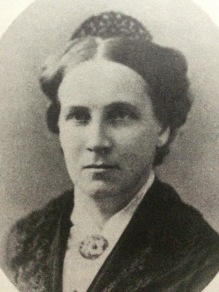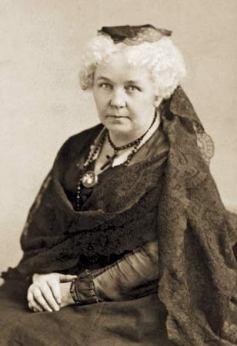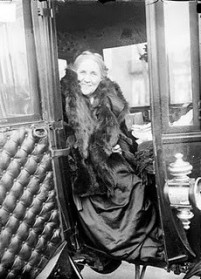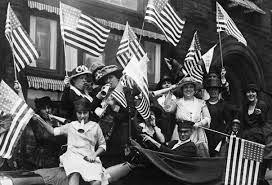
It was while living in Lawrence, Kansas that William and Helen Starrett first met Susan B Anthony. In 1867, Miss Anthony and Elizabeth Cady Stanton had been travelling through Kansas, speaking on the subjects of temperance and universal suffrage.
A convention of universal suffragists had been called in Lawrence that fall, and local supporters of the movement had been asked to entertain the many out of town visitors who’d need places to stay while in town. Over the years, the Starretts had become friends with former governor Charles Robinson. Gov Robinson had been active in the universal suffrage cause from the beginning, and as one of the convention hosts, asked Helen if she would do him the personal favor of hosting Elizabeth Cady Stanton during her stay. Although the Starrett house was full of babies and William’s sister, Annie, had been living with them, Helen reluctantly agreed. It was a great honor to have been asked to host such an important and influential guest, and although she and William would have to give up their bedroom to accommodate her, she was willing to make the sacrifice for a woman with such a warm and lovely reputation.

Helen and William prepared their own bedroom as the guest quarters and readied the house for their long-term guest. The morning she was to arrive, a messenger appeared at the door with a note from Gov Robinson. The note informed Helen that Mrs Stanton had found relatives in town with whom she’d stay, and Miss Susan B Anthony would be her guest instead.

Susan B Anthony had been characterized in the newspapers as an unfriendly and unlikeable woman. She was a tall, lean, angular spinster with a stern demeanor, and one eye that was slightly askew. Nothing like the short little round, rosy cheeked, mother of seven with sparkling blue eyes, puffy white hair, and a sunny disposition that all the papers raved about. Helen could not bear the though of having such an unfriendly presence in her home for such an extended period.
Hastily, Helen threw on her bonnet and shawl, told Annie that she was off to Governor Robinson’s house to inform him that she did not want Miss Anthony as a houseguest and that she would not have her.
When Helen reached the gate, she face face-to-face with a tall woman in a long, plain, black, Quaker-style dress with a white shawl around her shoulders and a simple alligator bag. The woman introduced herself as Miss Susan Anthony, and explained that she had been sent to stay with Mrs Starrett during the convention. Helen apologized and explained to Miss Anthony that she had caught her just as she was on her way to tell Gov Robinson that circumstances had changed and she would be unable to entertain a houseguest. But, since Miss Anthony had come such a long way, Helen invited her to stay to tea, and afterwards, they would see what alternate arrangements could be made.

As Helen prepared tea for her unwelcome guest, the Starrett babies fell in love with Susan B Anthony. Upon seeing the door to Annie’s room half-open, Miss Anthony peeked inside, and within minutes had made fast friends with Annie. For years, Annie had suffered from severe bouts of depression and anxiety, and had shuttered herself off from the outside world. Rather than exciting her nerves, Susan calmed Annie like no one else had ever done, entertaining her with stories of her travels and adventures. By the time tea had been served, everyone in the Starrett home was practically begging Susan Anthony to stay.
After tea that very first day, Susan rolled up her sleeves, tied on an apron, and took up a spot next to Helen in the home. She lightened the burden of Helen’s household duties. By the end of her six-week stay, Susan B Anthony had become more like a cherished family member than a houseguest, and they parted as beloved friends. Susan was an inspiration to Helen, and although she was twenty years older, this six week stay was the beginning of a friendship that lasted until Susan died in 1906.

Subsequent visits to the Starrett home happened over the next few years, and many of Helen’s children had fond memories of Miss Anthony. Sometimes she came alone, and sometimes by other suffragists like Elizabeth Cady Stanton or Rev. Olympia Brown stayed at the Starrett home with her. Following the failure of the first suffrage referendum, it was from Mrs Starrett’s parlor in Lawrence that Susan B Anthony announced her intention to work towards a Federal enactment for suffrage.

In 1869, Susan B Anthony organized a national convention for impartial suffrage in Washington DC. She wrote to her dear friend in Lawrence, inviting her to attend as a delegate from Kansas. Having had a baby six months prior and no disposable income, Helen politely and sadly declined. Shortly thereafter, Helen received Susan’s reply in the mail. In her reply, Susan informed Helen that she would provide a nurse for the baby for the duration of the convention so Helen could attend. Additionally, Miss Anthony enclosed a check for $25—and she wrote to Governor Robinson, asking him to raise a subscription among the businessmen of Lawrence to pay the remainder of her expenses. Since every man in high standing in the Lawrence community was in favor of women’s suffrage, there was no trouble raising the necessary funds. A nurse was hired to accompany Helen to Washington DC to care for the baby, and the women had the time of their lives. It was Helen’s first time to attend and speak at a national suffrage convention, but it wouldn’t be her last.

Over the years, Helen continued to travel and speak on behalf of women’s rights. Although some of those in attendance at the 1869 convention would drive a stake into the movement that would cause an 11 year split, dividing women’s rights and equal rights into two separate camps, Helen continued in her work on behalf of women and girls for the rest of her life. She became a business owner, a patent holder, a magazine owner, and a published author. After she was widowed, the single mother opened a school where she inspired thousands of girls for decades to come. And all of her own children grew up to be very successful—some of them famous—adults.

In February of 1920, Mrs Helen Ekin Starrett attended another women’s suffrage convention in Chicago. Only this convention was different from all the others. This was the Victory Convention. Finally, they had done it. The suffragists had finally won the right to vote for all American women. On June 4, 1919, a Joint Resolution of Congress proposed a constitutional amendment extending the right of suffrage to the women of the United States of America. And it passed. As the only surviving delegate to Miss Anthony’s first convention in 1869, eighty-year old Helen Ekin Starrett was an honored guest of the 1920 Victory Convention. Her prim, velvet bonnet and white silk gloves were the only sign that the smiling and happy elderly lady was of another era. She was a rockstar at the Victory Convention, vividly retelling her stories of the early days of the suffrage movement—of her first encounter with Susan B Anthony and their lifelong friendship; of all the years of conventions, marches, speeches, lectures, writing, lobbying and enrichment of future generations of educated girls and women. The convention, though a dream come true, was bittersweet. None of her friends—the early pioneers of the movement—had lived to celebrate with her. Susan B Anthony never lived to see her life’s work come to fruition.

On August 20, 1920, the 19th Amendment to the United States Constitution was ratified. Four months later, Helen Ekin Starrett passed away. And though she was mourned by the thousands of those who’s lives she touched, she couldn’t have lived a more full—and fulfilling—life.

© Julie Dirkes Phelps
Photographer, Author, Researcher, Archivist, and Storyteller.
© Copyright 2015.
All rights reserved. No part of this publication may be reproduced, distributed, or transmitted in any form or by any means, including photocopying, reposting, or other electronic or mechanical methods, without prior written permission. Be cool, don’t plagiarize. If you want to use something, just ask.

I love how your interesting history culminates with the sweet, smiling face of Helen Ekin Starret’s great great great great grandchild, who will never be barred from voting thanks to her ancestor!
LikeLiked by 1 person
Thanks! WHen I was finishing the piece, I remembered this picture that had run in the Williamson County Texas Sun a few years ago, and I thought OMG! Helen and Susan would just LOVE this! I am already crossing my fingers and looking to see if I can find a 100th anniversary celebration of the 19th Amendment– like the Victory Convention that we could go it together. She still won’t be old enough to vote yet, but I think it’d be amazing to go. In Helen’s honor!
LikeLiked by 1 person
Julie, Come to Lawrence to celebrate. Not sure whether one big bash will be scheduled, but so far there’s several presentations going on in Feb-March, etc.
LikeLiked by 1 person
I’ll see what I can do. I’ve got three kids in school, so traveling can be tricky when they’re not on break. Plus…. it’s still cold up there in Feb-March. I may have Helen’s DNA, but the weather-resistance gene somehow skipped me! I’m kind of a cold weather wimp.
LikeLike
What a wonderful piece of history for your family to hold dear!
LikeLiked by 1 person
Howdy! Would you mind if I share your blog with my facebook group?
There’s a lot of folks that I think would really enjoy your content.
Please let me know. Thank you
LikeLiked by 1 person
Hi Collin! I just saw you comment, sorry for the delayed response. Absolutely! Please share! I’ve receive so much feedback and email and spam and correspondence. Thanks so much for asking and for reading! —J
LikeLike
Hi Julie Phelps!
I would like to share a written version of this article with the League of Women Voters of Lawrence-Douglas County; either at our annual meeting or in our monthly newsletter, which is posted on our website. http://www.lawrenceleague.com. Would that be possible?
LikeLiked by 1 person
Debra,
Yes! I’m hoping to come to Lawrence soon and I’d love to meet with you. I’ve done a lot of research on the family in Lawrence, but any “boots on the ground” friendships I can make in the area would be helpful when I get there— I have a lot more than what is here on the blog. Also, Id love a copy of the newsletter if you’d mail me one. Shoot me an email and I am send you the mailing address. Email is the name of the blog at yahoo dot com. (If I put it here, the spambots go crazy!)
LikeLike
Hi Julie – I am hoping we might be able to help one another with research. I am a writer and historical reenactor portraying Mary Allen West. Miss West was the first president of IWPA, and upon her death was succeeded by Helen Starrett. Looking forward to hearing from you. I’m enjoying your blog!
LikeLiked by 1 person
Thank you! I’m afraid that I don’t know much about Mary Allen West, other than the fact that my great great grandmother succeeded her as the 2nd president of the IWPA. Helen was quite active in—and a huge proponent of—women’s clubs and women’s rights. I initially contacted IWPA to see if they had any information about Helen because what I’d seen from them about her was incorrect. They didn’t have much information, but shortly after my contacting them, a piece about her was written correcting the mistakes and used much of the new research I’d given them to better outline her life story. As I’m writing a book about her, my subsequent research has been less open. I have, however, been able to find some fabulous details about her and her life through newspapers and magazines and other archival sources. But, unfortunately, I don’t recall seeing Mary Allen West among my research. Helen and family moved to Chicago from Kansas, but Helen had been “commuting” (for lack of a better word) from St Louis, for months prior to their move. Since she was fairly well known by the time she moved to Chicago, and she was editor of a widely read magazine at the time, and she had seven children (the oldest three boys were quite a handful!) she might not have had much time to get to know many people before she was elected president. She had this magnetism that made people love her and want to put her in charge immediately, so who knows?!?! You can email me at the name of the blog as all one word at yahoo dot com (you know how spam is, so I can’t write it!). If I come across anything, I can let you know! And, if you’re in Chicago, maybe you can help me out!—Julie
LikeLike
Julie, Thrilled to know you’re writing a biography of Helen Ekin Starrett–she SO deserves one all her own! I only discovered her remarkable story last February with help from your terrific blog. I can send you my brief bio on her (focused on Lawrence with newspaper sources) and my “booklet” on Lawrence Suffragists (to be published in local anthology Fall 2020). Would love to share as a grateful Christmas/New Year’s gift!
Jeanne
LikeLiked by 1 person
Yes! I would LOVE to see and read your booklet! I’ve been researching Helen for a long time, piecing together things, events, accomplishments, etc., that weren’t passed down in the family. I’ve been to Lawrence a few times, and I love it there. Something about the town just feels familiar. I’d love to collaborate with you so I could have an interested researcher/friend/helper on the ground in Lawrence to help me with things I can’t get online. I haven’t had the time (or the money!) to spend the kind of time in LFK that I really need.
I love finding “fans” of Helen’s. She is ridiculously under appreciated. I’m so happy you contacted me!
Julie
LikeLike
Terrific! Happy to help you with Lawrence research. Please send me your snail mail address and I’ll get booklet, etc. in the mail to you.
LikeLike